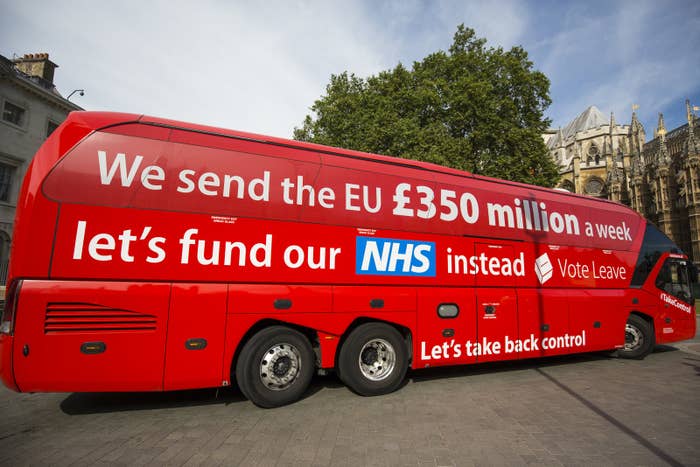
The High Court has ruled that the Electoral Commission, the body which oversees elections and regulates political finance in the UK, got the law wrong in its advice to Vote Leave during the EU referendum.
In a judgment handed down on Friday morning, the court found the Electoral Commission should not have told Vote Leave it could pay additional money to data firm AggregateIQ after it had reached its spending limit.
The court ruled it was not permitted under electoral law for Vote Leave to make these donations without declaring them as a campaign expense, contrary to the advice the commission gave the Brexit campaign.
The ruling will call into question the credibility of the Electoral Commission and reignite the controversy over the spending activities of Vote Leave during the referendum.
The donations have been at the heart of the long-running row over the Leave campaign's spending tactics.
During the 2016 campaign, Vote Leave spent £2.7 million on the services of AggregateIQ, a Canadian IT company credited with playing a pivotal role in the Brexit result.
After Vote Leave reached its spending limit, it made further donations to the company on behalf of student campaigner Darren Grimes and the Veterans for Britain group.
These donations amounting to £725,000 in the dying days of the referendum campaign were first revealed by BuzzFeed News in November 2016, but for a year the Electoral Commission repeatedly stated that there was no problem with the payments.
Then, in November 2017 it launched an investigation that ended in July with Vote Leave being fined £61,000 and reported to police after it was judged to have coordinated with the Brexit-supporting BeLeave group.
The founder of BeLeave, Darren Grimes, was also referred to police along with a Vote Leave official, David Halsall.
The Electoral Commission had advised Vote Leave that the donations were permitted under electoral law.
In an email to Vote Leave on 20th May 2016, the commission's guidance adviser Kevin Molloy wrote: “If you are supplying material to other campaigners without having a co-ordinated plan or agreement then the material is likely to be a donation from you to the other campaigner. If the donation is over £500 it will be reportable by the other campaigner. You would not need to report the cost of the material in your spending return unless you use the material yourself.”
This advice was challenged in court by the Good Law Project, which argued that campaigns should not be able to circumvent spending rules by making undeclared donations to separate groups campaigning for the same result.
Mr Justice Leggatt and Mr Justice Green agreed with the Good Law Project, ruling that the Electoral Commission had "misinterpreted" the rules. They said the commission had made a "mistaken assumption" that Vote Leave could make a donation to another participant without incurring referendum expenses.
Jolyon Maugham QC, director of the Good Law Project, said: “It is now clear that the Electoral Commission gave unlawful advice that encouraged Vote Leave to carry on spending. And it gave it selectively — no such advice was given to Stronger In. The regulator, charged with ensuring the referendum was fair, in fact unlawfully tiled the playing field in Leave's favour.”
Former Vote Leave chief executive Matthew Elliott said the commission should take responsibility for the Brexit campaign's rule breach: "The Electoral Commission’s defeat in the High Court today has thrown electoral law for future elections and referendums into total chaos. Either the Electoral Commission is wrong or the High Court is wrong.
He added: "Should the Electoral Commission choose not to appeal this judgment, they will be admitting that they gave Vote Leave incorrect advice and they should immediately reconsider the unfair fines they are seeking to impose on us because Vote Leave would not have made the donations that it did had it not been for the commission's clear advice."
The Electoral Commission said it had not yet decided whether to appeal. A spokesperson said: "We are reviewing the detail of this ruling and are considering our next steps".
They added: "The Court arrived at the same conclusion as the commission did in its investigation – that Vote Leave should have accounted for the expenditure on the digital services firm, Aggregate IQ – although it found an additional reason for reaching that conclusion. The commission imposed sanctions on Vote Leave for this offence and others found during the investigation."
